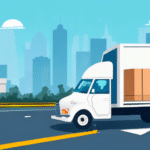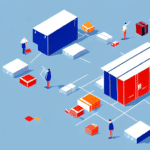3PLs: Comprehensive Guide for Optimizing Your Logistics Operations
If your business involves logistics management, you've likely encountered the term Third-Party Logistics (3PL). But what exactly does a 3PL do, and how can it benefit your business? In this in-depth guide, we delve into the world of third-party logistics providers (3PLs). We'll cover why businesses choose 3PL services, the key benefits they offer, the different types of 3PL providers, how to select the right partner, and more. By the end of this article, you'll understand how 3PLs can enhance your logistics efficiency and drive business growth.
What is a 3PL and How Does It Work?
A 3PL is a third-party logistics provider, a company that offers comprehensive logistics and supply chain management services to businesses across various industries such as manufacturing, e-commerce, and retail. Their primary objective is to manage and optimize a company's logistics operations, including transportation, warehousing, and fulfillment. By outsourcing these operational and logistical tasks to a 3PL, businesses can focus on their core competencies while leveraging the expertise and resources of the 3PL.
One of the key benefits of partnering with a 3PL is substantial cost savings. Outsourcing logistics operations allows companies to eliminate expenses related to maintaining their own warehouses, transportation fleets, and staffing. Additionally, 3PLs often have established relationships with carriers and suppliers, enabling them to negotiate better rates and pass these savings on to their clients.
Flexibility is another significant advantage of working with a 3PL. As a company's logistics needs fluctuate, a 3PL can adjust their services accordingly. For instance, if a company experiences a spike in demand, a 3PL can swiftly scale up operations to meet the increased volume. Conversely, during periods of decreased demand, a 3PL can reduce their services to help avoid unnecessary costs.
Why Businesses Need 3PL Services
There are several compelling reasons why businesses choose to outsource their logistics management to a 3PL:
- Complexity of Logistics: Logistics management is inherently complex, requiring significant time and resources. A 3PL brings specialized expertise to handle these complexities efficiently.
- Focus on Core Business: By delegating logistics tasks to a 3PL, businesses can redirect their focus and resources towards critical areas such as product development, marketing, and customer service.
- Access to Advanced Technology: 3PLs invest in cutting-edge logistics technology, including Transportation Management Systems (TMS) and Warehouse Management Systems (WMS), which can enhance operational efficiency and provide real-time visibility into supply chain processes.
- Risk Management: 3PLs help businesses identify and mitigate supply chain risks, such as disruptions from suppliers or carriers, ensuring more reliable and resilient logistics operations.
According to a Statista report, the global 3PL market is expected to grow significantly, driven by increased globalization, e-commerce growth, and the need for more efficient supply chain solutions.
Benefits of Using a 3PL Provider
Partnering with a 3PL offers numerous advantages for businesses, including:
- Cost Savings: Outsourcing logistics management helps businesses save on labor, transportation, and warehousing costs.
- Greater Efficiency: 3PLs optimize logistics operations, resulting in faster delivery times and reduced operational costs.
- Scalability: 3PLs provide scalable solutions that grow with your business, accommodating increasing or decreasing logistics needs seamlessly.
- Access to Technology: Leverage advanced logistics software and technologies that may be too costly or complex to implement in-house.
- Flexibility and Customization: Tailored logistics solutions to meet specific business requirements, enhancing overall operational flexibility.
The Different Types of 3PL Providers
3PL providers offer a variety of services tailored to different logistics needs. The most common types include:
- Transportation-Based 3PLs: Specialize in managing transportation operations, including shipping, freight forwarding, and delivery services.
- Warehousing-Based 3PLs: Focus on warehousing and inventory management, offering storage solutions and inventory control.
- Freight Forwarding 3PLs: Experts in managing international shipping and logistics, ensuring smooth cross-border transportation of goods.
- Integrated 3PLs: Provide comprehensive logistics services, encompassing transportation, warehousing, and fulfillment under one roof.
How to Choose the Right 3PL for Your Business
Selecting the appropriate 3PL provider is crucial for the success of your logistics operations. Consider the following factors when making your decision:
- Services Offered: Ensure the 3PL provides the specific services your business requires, whether it's transportation, warehousing, or specialized fulfillment.
- Experience and Expertise: Look for a 3PL with a proven track record in your industry and expertise in handling similar logistics challenges.
- Technology Integration: Choose a 3PL that utilizes advanced logistics technology and can seamlessly integrate with your existing systems.
- Cost Structure: Evaluate the 3PL's pricing model to ensure it aligns with your budget and offers transparent cost structures.
- Customer Service and Communication: Effective communication is vital. Select a 3PL that offers reliable customer support and clear communication channels.
Cost Considerations When Working with a 3PL Provider
While partnering with a 3PL can lead to cost savings, it's essential to understand the various costs involved:
- Direct Costs: These include the fees for the 3PL's core services, such as transportation, warehousing, and fulfillment.
- Indirect Costs: Additional expenses may arise from activities like shipping fees, integration costs for systems, and value-added services.
- Opportunity Costs: Consider the potential benefits you might forego by choosing one 3PL over another, including service quality and scalability options.
According to a Forbes analysis, businesses can save up to 20-30% on logistics costs by effectively partnering with the right 3PL provider.
Common Misconceptions About 3PLs Debunked
There are several myths surrounding 3PLs that can deter businesses from leveraging their services. Let's clarify some common misconceptions:
- 3PLs are Only for Large Businesses: This is false. 3PLs cater to businesses of all sizes, from startups to large enterprises, providing scalable solutions that fit various needs.
- Working with a 3PL Means Losing Control: While 3PLs handle logistics operations, businesses retain control over their inventory, branding, and customer service, ensuring alignment with their core values.
- 3PLs are Too Expensive: Although there are costs associated with 3PL services, the overall savings from increased efficiency and reduced overhead often make them a cost-effective option.
How Technology is Changing the Landscape of 3PLs
The logistics industry is undergoing a technological transformation, significantly impacting how 3PLs operate. Key technological advancements include:
- Automation: Automation technologies, such as automated palletizing and robotics-assisted order picking, are streamlining logistics processes, reducing errors, and increasing efficiency.
- Artificial Intelligence and Machine Learning: AI and machine learning are being utilized to optimize routing, predict demand, and enhance delivery accuracy, leading to faster and more reliable services.
- Drones and Autonomous Vehicles: Although still in the nascent stages, drones and autonomous vehicles hold the potential to revolutionize last-mile delivery, offering faster and more cost-effective solutions.
According to a McKinsey report, the adoption of AI in 3PL operations is expected to increase efficiency by up to 25% over the next five years.
Case Studies: Successful Businesses That Have Utilized 3PL Services
Numerous businesses have achieved significant success by partnering with 3PL providers. Here are a few notable examples:
- Newegg: By outsourcing its logistics management to a 3PL, Newegg was able to reduce shipping times by 15% and increase delivery speeds, enhancing customer satisfaction.
- Dollar Shave Club: Collaborating with a 3PL allowed Dollar Shave Club to focus on expanding its customer base while the 3PL handled intricate logistics tasks efficiently.
- Golfsmith: Partnering with a 3PL enabled Golfsmith to streamline its warehousing and fulfillment operations, resulting in a 20% reduction in operational costs and improved order accuracy.
Future Trends in the 3PL Industry
The 3PL industry is poised for significant evolution in the coming years, driven by several key trends:
- Increased Use of Technology: Continued adoption of advanced technologies, including blockchain for supply chain transparency and IoT for real-time tracking, will enhance 3PL capabilities.
- Greater Focus on Sustainability: As environmental concerns rise, 3PLs are expected to implement more sustainable practices, such as using electric vehicles and optimizing routes to reduce carbon footprints.
- Enhanced Collaboration: 3PLs will likely engage in closer collaboration with other supply chain partners, fostering seamless integration and more efficient logistics processes.
- Customization and Personalization: Offering more tailored logistics solutions to meet the unique needs of different industries and businesses will become a standard practice.
Tips for Maximizing the Benefits of Working with a 3PL Provider
To fully leverage the advantages of partnering with a 3PL, consider the following strategies:
- Communicate Openly: Maintain transparent and frequent communication with your 3PL to ensure alignment of goals and expectations.
- Optimize Your Processes: Collaborate with your 3PL to identify and eliminate inefficiencies in your logistics operations, enhancing overall performance.
- Monitor Performance: Regularly assess your 3PL's performance through key performance indicators (KPIs) to ensure they are meeting your business objectives.
- Prepare for Growth: Work with your 3PL to develop scalable solutions that can accommodate your business's growth and evolving logistics needs.
How to Integrate Your Business Systems with a 3PL Provider
Seamless integration between your business systems and your 3PL's systems is crucial for efficient operations. Here are some tips to facilitate this process:
- Choose Compatible Systems: Ensure that your business's software platforms are compatible with those used by the 3PL to facilitate smooth data exchange.
- Collaborate Closely: Work in tandem with your 3PL's technical team to determine the best integration approach, addressing any potential challenges proactively.
- Ensure Data Accuracy: Validate that all data being transferred is accurate and up-to-date to prevent discrepancies and operational issues.
- Conduct Thorough Testing: Before going live, rigorously test the integration to identify and rectify any issues, ensuring a flawless transition.
Risks and Challenges Associated with Working with a Third-Party Logistics Provider
While 3PLs offer numerous benefits, it's important to be aware of potential risks and challenges:
- Choosing the Wrong Provider: Selecting an unsuitable 3PL can lead to increased costs, inefficiencies, and potential disruptions in your supply chain.
- Integration Difficulties: Integrating your systems with a 3PL's can be complex and may require significant time and resources to achieve.
- Data Security Concerns: Sharing sensitive business and customer data with a third party introduces security risks. Ensure that your 3PL has robust data protection measures in place.
- Loss of Control: Outsourcing logistics means relinquishing some control over operations, which can be mitigated through clear contracts and strong communication.
Choosing Between In-House Logistics and Outsourcing to a 3PL
Deciding whether to manage logistics internally or outsource to a 3PL depends on various factors. Consider the following when making your decision:
- Cost: In-house logistics can be expensive, requiring investments in infrastructure, technology, and personnel. Outsourcing to a 3PL can often provide a more cost-effective solution.
- Expertise: 3PLs possess specialized knowledge and experience in logistics management, which can be difficult to replicate internally.
- Scalability: As your business grows, scaling logistics operations in-house can be challenging. A 3PL offers scalable solutions that can adapt to your evolving needs.
- Control: While outsourcing means sharing control over logistics operations, it allows your team to focus on strategic initiatives and core business activities.
The Bottom Line
Partnering with a 3PL provides an effective solution for businesses aiming to streamline their logistics operations. By outsourcing to a 3PL, companies can save time and resources, enhance operational efficiency, and achieve significant cost savings. Understanding the role of 3PLs, the benefits they offer, and how to select the right provider empowers businesses to make informed decisions about their logistics strategies. Embracing a 3PL partnership can be a pivotal step towards optimizing your supply chain and driving business growth.






















